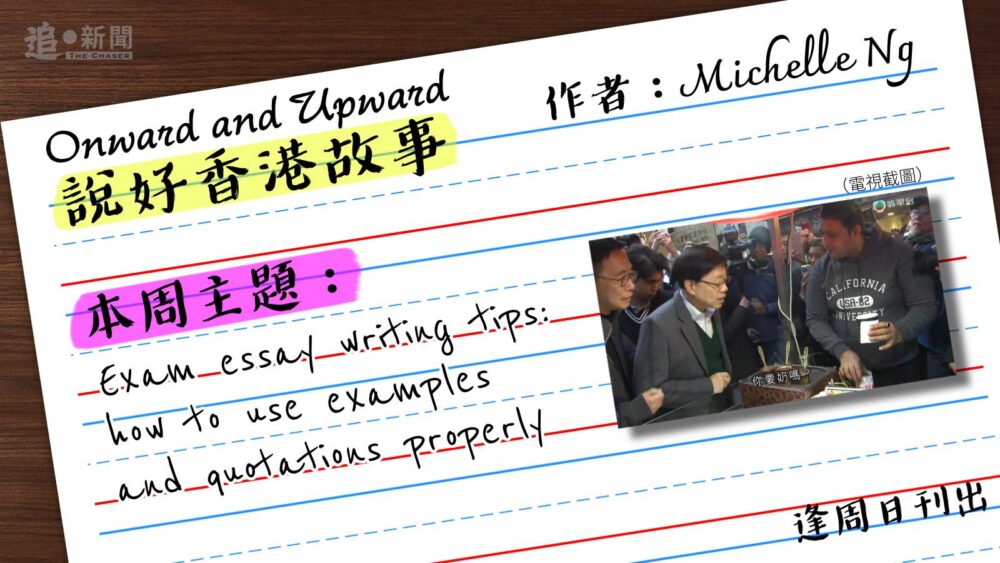
The three-paragraph script below was written by a candidate who sat for her UKiset. To differentiate her text from mine, I’ve put her copy in italics.
報道無罪 知情有價 請即訂閱《追新聞》:
https://www.patreon.com/thechasernews
Exam writing topic: “It is important to stop procrastinating”
1. Certainly, every person has bad habits. Some people may be in the habit of speaking rudely; some tend to be deaf to others’ opinions; some are inclined to delay. However, there is no doubt that allowing yourself to be controlled by bad habits does a great harm to personal development.
The candidate’s use of “however” is wrong; the second sentence in her introduction doesn’t negate the first. If she insists on using “however,” however, she should have to come up with something like this:
“Allow the temptation to be rude to take root, and you’ll lose friends. Disregard the opinion of others as a matter of routine, and you’re likely to make more mistakes. Of all the bad habits in the world, however, none is more damaging than the tendency to procrastinate: do so long enough and often enough, and you’ll end up old and weighed down by wasted potential and regret.”
2. It is not too much to say that it is a destructive behavior to be controlled by bad habits while it is constructive to change unwanted habits . If bad habits are allowed to be developed, they will get out of control and become big obstacles to life or career. For example, a delayed-prone person will hardly restrain himself from missing the deadline. Understandably, he will have few chances to be entrusted with important tasks and then will barely be professionally experienced enough to gain promotion. On the contrary, it is beneficial to change unwanted habits and acquire good ones, because good habits can make people more competent and thus widen the door to success.
In the main body of her essay, the candidate fails to develop any semblance of an argument. There is some attempt to use an illustration to show the damaging effects procrastination (“a delayed-prone person” failing to “gain promotion”), but instead of elaborating further, she trots out a misused “on the contrary,” and then reverts back to the circular reasoning that plagues the first part of her paragraph.
A more effective use of illustration(s) would look like this:
“Ask any person who has gained so much weight that she scarcely resembles her younger self how she came to be this fat, and she’ll probably tell you “my weight just crept up without my being aware of it.” Procrastination eats up our lives in a similar fashion: if we keep on putting off self-improvement, we become used to putting it off. And then, suddenly one day, when we see younger people surpassing us – only then do we become aware that we’ve passed our prime. So, even if it’s only to relieve us of the horror of this cruel awakening, it’s worth it to get into the habit of tackling tasks promptly.
I would actually go further and argue that it is through the process of realizing our ambitions that we get to experience life at its fullest: toil mixed with bliss, pain mixed with satisfaction. This is why, despite the physical and mental strain of Marie Curie’s four-year marathon of isolating radium in a cold, leaking shed – she had to extract pure radium to convince established scientists of its existence – when she looked back on her life, she singled out this period as the happiest time of her career. I get to experience this state of mixed joy on a small scale, as I work hard on my writing and see myself improving little by little.”
3. In summary, bad habits will probably make it impossible for us to achieve our ambitions. Therefore, we should be alert to our bad habits and make persistent efforts to break them.
Chances are way more than half of the exam candidates would have started their conclusions with “in summary” or “to summarize,” so it’s best to avoid the phrase altogether. One way out is to cite a well-known story or saying that’s relevant to the theme of your piece, and use it to expand on what you’ve already said:
“Whoever it was that coined the phrase ‘the sweet smell of success’ must have known this: success is sweeter when we have suffered and sacrificed for it. This is why the chronic procrastinator is the most foolish member of mankind: she sets out to avoid the unpleasantness of being self-disciplined, but she ironically ends up living a life that’s filled with nothing but unpleasantness – no meaningful career, no money, no sense of accomplishment.”
Michelle Ng
英國牛津大學畢業,前《蘋果日報》和《眾新聞》專欄作家,現在身在楓葉國,心繫中國大陸和香港。
聯絡方式: michelleng.coach@proton.me
個人網站: https://michellengwritings.com
逢周日英國時間晚上8時 / 周一香港時間凌晨4時刊出
《追新聞》無金主,只有您!為訂戶提供驚喜優惠,好讓大家支持本平台,再撐埋黃店。香港訂戶可分享給英國親友使用。



